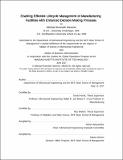Enabling effective lifecycle management of manufacturing facilities with enhanced decision making processes
Author(s)
Hammer, Michael Kenneth
DownloadFull printable version (1.717Mb)
Other Contributors
Leaders for Global Operations Program.
Advisor
David Hardt and Roy Welsch.
Terms of use
Metadata
Show full item recordAbstract
As a global manufacturing company, Company X has built up an extensive and varied portfolio of manufacturing facilities. These facilities vary greatly in capability, age, and performance. This creates difficulties in effectively managing the manufacturing portfolio to best utilize the different resources. One approach to this issue of resource management is to analyze the manufacturing facilities as having a lifecycle. The lifecycle of manufacturing facilities is hypothesized to be a function of the people involved in the operations at the facility. This is generally captured under the term "culture." Part of the work focuses on characterizing the culture of a facility through the performance of its equipment in an effort to predict future performance, thus helping to determine the expected productive lifecycle of a facility. A decision tree framework is developed to help aid in this lifecycle determination process. The decision tree uses a combination of existing and modified metrics in providing recommendations for reference when determining the future of the manufacturing network. Importantly, the decision tree analysis is intended to be completed on a recurrent basis and executed with a focus on process discipline. Implementation of the decision tree will lead to improved decisions for the manufacturing network and an increased understanding
Description
Thesis: M.B.A., Massachusetts Institute of Technology, Sloan School of Management, in conjunction with the Leaders for Global Operations Program at MIT, 2017. Thesis: S.M., Massachusetts Institute of Technology, Department of Mechanical Engineering, in conjunction with the Leaders for Global Operations Program at MIT, 2017. This electronic version was submitted by the student author. The certified thesis is available in the Institute Archives and Special Collections. Cataloged from student-submitted PDF version of thesis. Includes bibliographical references (page 47).
Date issued
2017Department
Leaders for Global Operations Program at MIT; Massachusetts Institute of Technology. Department of Mechanical Engineering; Sloan School of ManagementPublisher
Massachusetts Institute of Technology
Keywords
Sloan School of Management., Mechanical Engineering., Leaders for Global Operations Program.